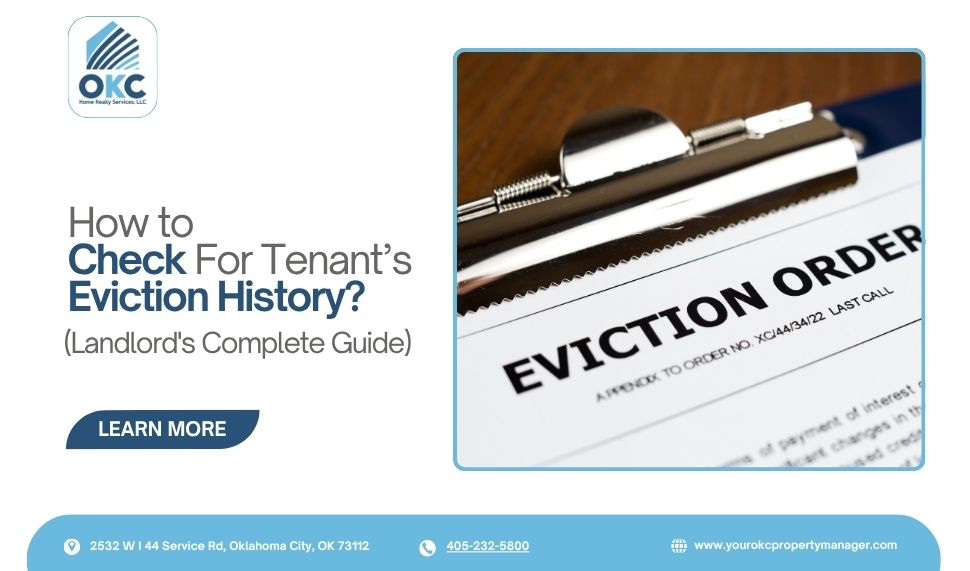You’ve got a promising rental applicant with great income, friendly during the showing, and quick to submit paperwork. Everything seems perfect, but when you dig a little deeper and discover an eviction filed two years ago. Suddenly, what looked like an easy approval becomes a high-stakes decision. This is the exact moment why checking a tenant’s eviction history is one of the most important steps in the screening process.
As a property manager in Oklahoma City with 20 years of experience, I’ve seen how one bad tenant can cost landlords thousands of dollars and countless sleepless nights. An eviction record search gives you critical information about a prospective tenant’s rental history, including whether they were ever evicted, the reasons behind the case, and how the situation was resolved.
According to the Princeton University Eviction Lab, more than 1 million eviction cases were filed in the 12 months leading up to late 2024/early 2025 across the 10 states and 36 cities they track. In the most recently tracked month, approximately 78,834 evictions were filed in those same areas. With eviction proceedings on the rise, the stakes have never been higher for landlords to conduct thorough tenant screening.
But what many landlords don’t realize is that there’s a right way and a wrong way to check eviction records. Doing it incorrectly, you could face fair housing violations or miss red flags entirely. And doing it right, you’ll build a portfolio of reliable tenants who pay on time and treat your units with respect.
In this blog, I’ll walk you through exactly how to check for evictions, what information you’ll find in an eviction report, and most importantly; how to use that information legally and effectively as part of your tenant screening process.
What Exactly Is an Eviction Record Search?
An eviction record search is a process of examining a person’s history to determine if they have been evicted by landlords from their previous rental properties. Landlords or property managers often conduct eviction record searches to review a tenant’s rental history and identify any past issues before approving an application.
Although each state organizes its court system differently, most eviction filings fall under public records, meaning you can access them through approved tenant-screening services or by searching local court databases. Still, an eviction record doesn’t always reveal the full story behind a housing dispute, so it should be reviewed alongside other screening information.
What Does an Eviction Report Include?
An eviction report summarizes all the key details related to an eviction filing. Most eviction reports contain the following pieces of information:
- The tenant’s (defendant’s) full name
- The property owner’s or plaintiff’s name
- The plaintiff’s address
- The date the eviction was filed
- The court location or courthouse address
- The outcome of the eviction case
- The reason the property owner filed the eviction
- The type of eviction action taken
- The final judgment or ruling
This structure gives readers exactly what they expect when they search the topic: clear, organized, and actionable information.
Why Landlords Must Check Tenant’s Eviction History Before Renting?
Checking a tenant’s eviction history isn’t just a best practice; it’s your first line of defense against costly rental nightmares. Let me explain why this step is non-negotiable for informed decisions and protecting your investment.
1. Minimize Financial Risk and Income Loss
Tenants with eviction histories are statistically more likely to default on rent payments again. When you conduct a thorough eviction check, you’re essentially predicting future behavior based on past patterns. A tenant who’s been evicted for non-payment once may struggle with rent obligations again, leaving you with months of lost income.
2. Protect Your Property from Damage
Eviction records often reveal lease violations beyond just missed rent payments. Some tenants were evicted for property damage, unauthorized occupants, or illegal activities. Understanding this history helps you identify tenants who respect rental properties versus those who don’t.
3. Ensure Legal Compliance and Standardized Screening
Conducting eviction checks helps you maintain a standardized, non-discriminatory screening process that complies with fair housing laws. When you evaluate all applicants using the same criteria including eviction history, you’re protecting yourself legally while making informed decisions.
4. Save Time and Resources
Dealing with an eviction costs an average of $3,500 to $10,000 when you factor in lost rent, legal fees, property damage, and turnover costs. Spending a few hours checking eviction history upfront can save you months of headaches and thousands of dollars down the line.
How Do Landlords Check for Evictions: Step-by-Step Guide
Checking a tenant’s eviction history is where most landlords either protect themselves or set themselves up for disaster. After managing properties in Oklahoma City for years, I’ve developed a reliable working system that uses multiple verification methods to give you a clear and accurate view of a tenant’s past.
Step 1: Check Public Court Records
Your first stop should always be your local court system’s online database. Most states have digitized their civil court records, making eviction searches significantly easier than they were a decade ago.
But remember, not all court systems use the same terminology. Eviction cases may be filed under “unlawful detainer,” “forcible entry and detainer,” “summary possession,” or “dispossessory proceedings,” depending on your location.
- State/County Websites: Access your county clerk’s website or state court portal and use the case search function. For instance, you can access the Oklahoma County Court to search court records for Oklahoma County. Enter the applicant’s full name exactly as it appears on their application, then search variations including middle initials, previous surnames, and alternate spellings. Since applicants may have lived in multiple locations, expand your search to neighboring counties and all jurisdictions listed in their rental history.
- In-Person Search: As the court maintains all the records, you can visit the specific state or county court in person where the likely eviction occurred and request access to the eviction records. But always keep in mind that the procedure can vary from one state to another.
Step 2: Tenant Screening Report
Professional tenant screening services like OKC Home Realty Services offer comprehensive background checks that compile eviction records from multiple jurisdictions nationwide. These services aggregate court records, credit reports, criminal background information, and address verification into a single report, typically delivered within 24-48 hours. Eviction filings are public records, but they can be scattered across multiple court systems. Professional screening aggregates this data into a single report. This is why most landlords rely on a trusted screening service and so should you.
Step 3: Check Credit Report
While eviction proceedings themselves do not appear directly on credit reports, the financial consequences typically do. When conducting credit screening, look for specific indicators that suggest past eviction issues like collection accounts from property management companies, court judgements, or liens. These financial markers often indicate eviction occurred, even if the tenant doesn’t disclose it. According to TransUnion, unpaid rent judgments can remain on credit reports for up to seven years, giving you a long lookback period.
Step 4: Contact Previous Landlord
Even though eviction reports are valuable, a landlord’s firsthand experience gives context to the court filings. Never accept just one landlord reference, especially if it’s only the current landlord. Instead, go back to at least two rentals, preferably three. Ask for landlord contact information for every address they’ve listed in the past five years. Then make those phone calls. Don’t just email; actually call and have a conversation.
You can normally ask the following questions:
- Rental History: Did the tenant pay rent on time, and did they leave the unit in good condition?
- Eviction History: Was the tenant ever evicted or given a notice to vacate? If so, why?
- Lease Violations: Did the tenant break any lease terms, like unauthorized pets, subleasing, or property damage?
- Behavior: Were there any issues with noise, disturbances, or complaints from neighbors?
- Eligibility for Re-Rent: Would they like to rent to this tenant again?
Step 5: Rental Applicant Evaluations
You can do a rental application evaluation by asking about their past evictions right on the rental application. Cross-reference the applicant’s response with your findings. Discrepancies between disclosed information and court records indicate potential dishonesty, which is often more concerning than the eviction itself.
Sometimes legitimate reasons exist like disputed evictions, cases filed but not finalized, or identity confusion in court records. Document all explanations and evaluate how they align with verified information.
Step 6: Legal Aid Organizations
If you are unable to get the information, you can ask for assistance from legal aid organizations. Depending on your location, regional eviction databases maintained by local landlord associations or property management organizations may provide additional information. Organizations like the Apartment Association of Central Oklahoma offer networking opportunities where property managers share experiences and maintain informal databases of tenant performance, offering insights beyond official court records. But remember that you should use these supplementary databases as an additional verification tool rather than primary screening sources.
What to Do If a Tenant Has an Eviction on Their Record?
Finding an eviction on a tenant’s report doesn’t automatically mean denial. But it does mean you need to show down and evaluate the situation carefully. Here’s how to handle this situation professionally and legally.
1. Evaluate the Context and Circumstances
Not all evictions carry equal weight so start by reviewing the eviction details in context. Examine when the eviction occurred, the reason behind it, and whether the tenant resolved the underlying issues. According to the Eviction Lab, many evictions form temporary financial hardships rather than irresponsible behavior. An eviction from five years ago due to job loss is fundamentally different from multiple recent evictions for property damage or chronic non-payment. Request a written explanation form the applicant. Did they lose employment during an economic downturn? Face medical emergencies? Experience domestic violence situations?
2. Access Current Financial Stability
Even if an eviction occurred, current financial stability can outweigh past problems. Verify the tenant’s income and if the applicant now demonstrates stable income at three times the monthly rent, maintains good credit aside from the eviction-related debt, and provides strong references from the subsequent landlords, they may still be valid candidates.
3. Consider Requiring Additional Safety Measures
If you decide to move forward with an applicant who has an eviction history, implement risk-mitigation strategies. Request a co-singer or a guarantor with a strong credit and rental history, request additional security deposit where legally permitted, or establish a month-to-month lease initially to evaluate performance before committing to longer terms.
Legal & Fair Housing Considerations for Landlords
Let’s talk about something that can get you into serious trouble if you’re not careful: fair housing laws. I’ve seen well-intentioned landlords face expensive lawsuits simply because they didn’t understand how to legally use eviction records in their screening process.
The Fair Housing Act, 42 U.S.C. §§ 3601 protects seven classes: race, color, national origin, religion, sex, familial status, and disability. You cannot apply different eviction screening standards based on these characteristics. According to the U.S. Department of Housing and Urban Development (HUD), first-time violations can result in fines up to $26,262, while repeat offenders face penalties exceeding $131,000.
When you use tenant screening reports, the Fair Credit Reporting Act governs your obligations. You must obtain written consent before pulling reports, and if you deny an application based on screening results, you’re required to provide an adverse action notice.
Additionally, some jurisdictions have additional protections. Certain cities have “ban the box” ordinances that restrict when you can ask about eviction history. For instance, in Oklahoma, while state law provides landlord-friendly eviction procedures under Title 41 of Oklahoma Statutes, you still must comply with federal fair housing requirements.
Protecting Your Investment Beyond Eviction History Checks with Expert Property Management
Eviction records or history checks help landlords screen trustworthy and reliable tenants, mitigate potential risks, protect their property, and have stable incomes. Though eviction screening is essential, it’s just one piece of comprehensive property management. And after managing numerous properties myself, I understand that managing overall responsibilities while maintaining your own schedule can be overwhelming.
That’s where professional property management makes the difference. At OKC Home Realty Services, we handle every aspect of tenant screening; including comprehensive eviction history checks, credit analysis, and landlord verification, so you can rest easy knowing your property is protected.
Ready to enjoy steady cash flow and peace of mind? Contact OKC Home Realty Services today for reliable tenant screening and comprehensive property management solutions.

Author
Scott Nachatilo is an investor, property manager and owner of OKC Home Realty Services – one of the best property management companies in Oklahoma City. His mission is to help landlords and real estate investors to manage their property in Oklahoma.
 (
(









